OnePlus 8T vs iPhone 12
We may earn a commission if you make a purchase from the links on this page.

OnePlus didn’t waste any time — just a day after the announcement of the iPhone 12, the new OnePlus 8T has made its debut.
With a $749 price-tag on the OnePlus 8T and the iPhone 12’s $799 ($829 unlocked), they occupy pretty much the same price tier. But how do they stack up against each other?
They are pretty much great deals on both sides. The OnePlus 8T flies with a 120 Hz refresh rate screen and has more… let’s call them “experimental” features with its quad cameras on the back. But both have promising displays and the best specs from the Android and iOS camps respectively.
It does come down to operating system preference and your own electronic ecosystem at home. But the OnePlus 8T does look to be a worthy adversary to the iPhone 12.
Apple’s new iPhone 12 has the boxy design of the iPad Pros and MacBooks, giving us a fresh new style to gawk at and to reminisce the good old iPhone 5 days. The OnePlus 8T has its sleek design with a back that tapers off around the edges for a better fit in the palm.
Both devices have glass panels on their backs — on the OnePlus 8T, it has a matte finish, while the iPhone 12 is glossy. When it comes to color choice, you can get the 8T in either Aquamarine Green or Lunar Silver. The iPhone 12 comes in 5 fresh colors — green, blue, red, white, and black.
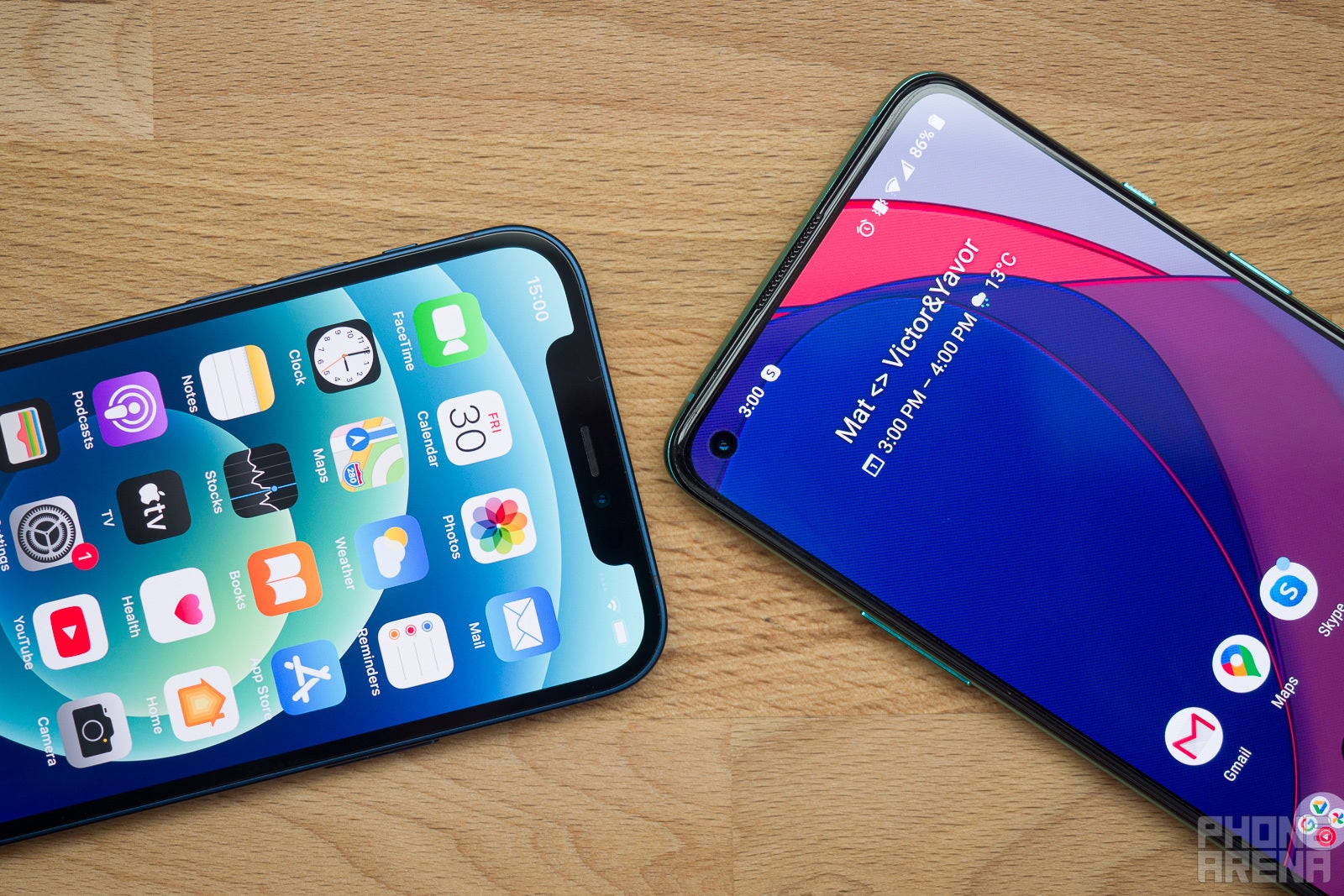
On the front, the OnePlus 8T has a 6.55-inch screen with a 1080 x 2400 pixel resolution. That’s an aspect ratio of 20:9 and a pixels-per-inch density of 402. The iPhone 12 has a 6.1-inch screen in a 19.5:9 aspect ratio, resolution 1170 x 2532 (457 PPI).
Both panels are OLED and both are excellent in terms of color and contrast. However, the OnePlus 8T does have 120 Hz refresh rate capabilities with redesigned Oxygen OS animations for extreme smoothness. The iPhone 12, sadly, is still in the 60 Hz camp.
Still, Apple’s screen is certified for Dolby Vision and HDR10 — which flow with its camera capability to shoot Dolby Vision clips in 4K — as well as the HLG standard. And yes, we tried it. Dolby Vision HDR clips shot on the iPhone do not play on the OnePlus 8T. However, they do play on a Samsung Galaxy Note, which also has an HDR10 screen.
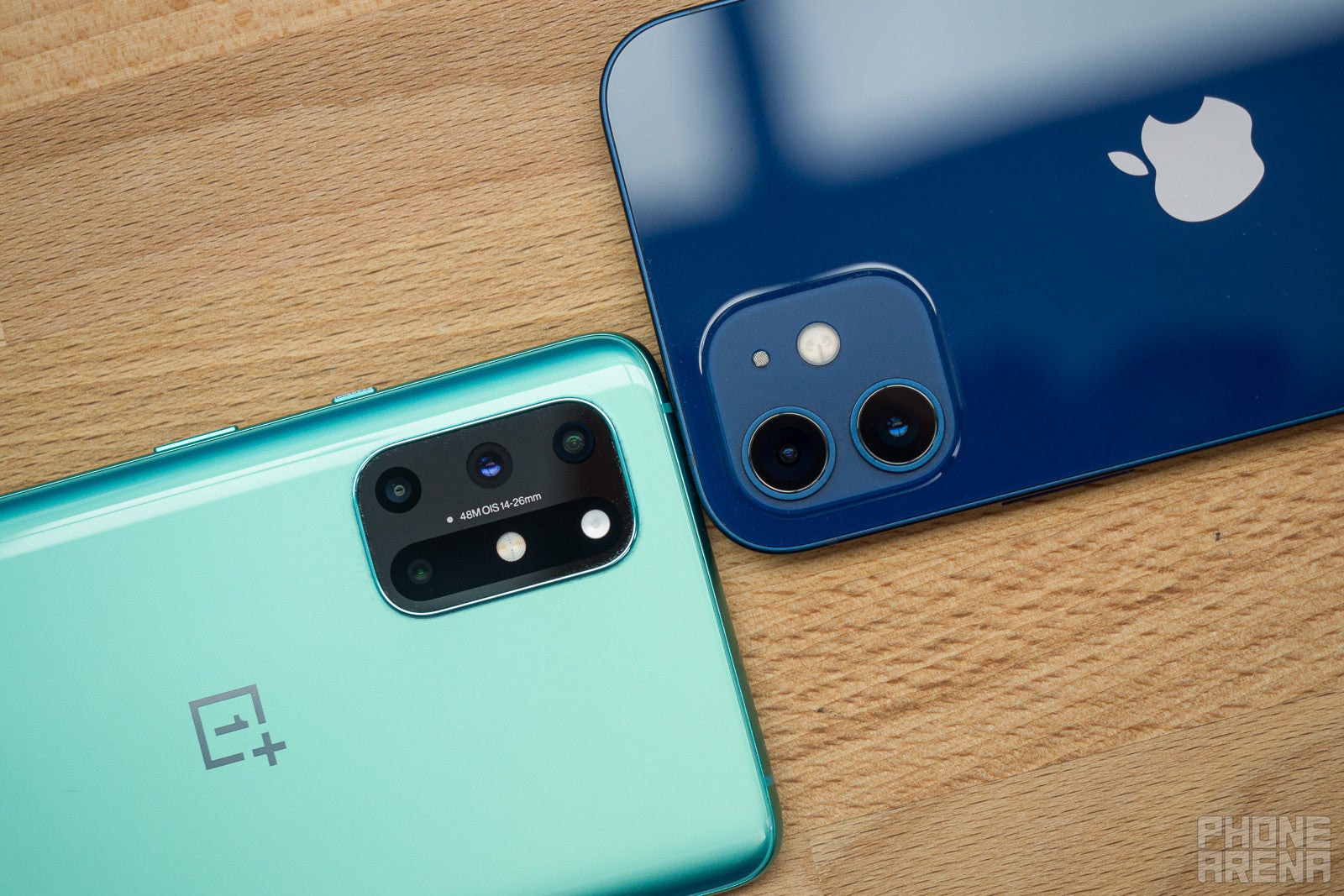
OnePlus pulled out yet another quad-camera setup on the back. The main sensor has a 48 MP resolution with an aperture size of F1.7. The individual pixels are 0.8 μm small, but OnePlus does use pixel binning — clustering pixels in groups of 4 to take 12 MP photos with better light-sensitivity.
The iPhone 12’s main camera is 12 MP, with 1.4 μm pixels. That does make them smaller than a quad pixel cluster on the OnePlus 8T camera, but the iPhone also has a slightly wider aperture — F1.6.
As secondary cameras, both phones have ultra-wide-angle shooters. On the OnePlus 8, it has a 16 MP sensor, while the iPhone 12 sticks to 12 MP.
Then, the OnePlus 8 has yet another two cameras. A 5 MP macro shooter and 2 MP monochrome camera. These are… well, questionable. I’ve never been wowed by a macro camera on a smartphone and they seem to only exist so that the marketing material for the phone can say “quad-camera”.
On the front, the OnePlus 8T has a 16 MP selfie camera, the iPhone 12 has a 12 MP camera yet again.
When it comes to features, the iPhone 12 can shoot 4K video at 30 FPS in Dolby Vision HDR, which is pretty impressive. But the OnePlus 8T strikes back with a Video Nightscape, which should presumably take better clips in the night. The OnePlus 8T also has portrait video — it takes clips with a simulated bokeh effect on the background. It hasn’t been a great feature in previous iterations, so we’ll see how it does.
When it comes to audio, we have two phones with stereo drivers here. And both use the same system — a bottom-firing speaker for the chunkier sound, and an amped earpiece for a secondary driver. Previous experience with these brands tells us to expect great audio performance from both camps.
We have two phones with top-tier processors here. The OnePlus 8T has a Snapdragon 865 (now a Plus, though), with 8 GB or 12 GB of RAM. The iPhone 12 is powered by Apple’s outstanding, 5 nm A14 silicon, but is paired with 4 GB of RAM (according to leaks, we are still waiting on a teardown here).
These specs allow the phones to run their respective operating system at flying speeds. OnePlus’ Oxygen OS is often praised as a super-clean Android experience. And OnePlus takes the time to tweak the animations to feel fast and responsive — something that is further amplified by the 120 Hz screen.
Apple’s iOS is a smooth system in its own right and, of course, runs stellar on Apple’s hardware.
These two systems are coming closer and closer together with each passing year. The App Store and Play Store barely have any system-exclusive 3rd party apps in them nowadays. iOS 14 added widgets. Android finally has its Nearby Share (AirDrop alternative).
OnePlus put emphasis on gaming with a revised Gaming Tool for hardware optimizations, automatic notification blocking, and even WhatsApp messaging without leaving your game. OnePlus also hits 90 FPS on Fortnite… while Apple banned the latter. It’s kind of fun that this seems to be becoming a selling point.
Either one of these phones will provide a satisfactory software experience. Choice is up to two things — what the user is used to and what type of ecosystem that smartphone is going to be thrown in.
Apple has always aimed at that “one-day battery life”. Balancing a thin device with enough of a cell inside to last you from one nightly charge to the other. Apple doesn’t share exact specs, but preliminary rumors say that the iPhone 12 has a 2,775 mAh battery.
The OnePlus 8T has a 4,500 mAh cell, which should last quite a while. But not only that, it has 65 W Warp Charging brick that tops the phone off in 39 minutes. That’s two-thirds of an hour to get from 0% to 100%! The Warp Charger is so powerful, in fact, that it can also juice up laptops.
With a $749 price-tag on the OnePlus 8T and the iPhone 12’s $799 ($829 unlocked), they occupy pretty much the same price tier. But how do they stack up against each other?
OnePlus 8T vs iPhone 12 design and display
- OnePlus 8T is slightly bigger
- OnePlus 8T has a matte back vs glossy on the iPhone 12
- OnePlus 8T comes in 2 colors, iPhone 12 comes in 5
Apple’s new iPhone 12 has the boxy design of the iPad Pros and MacBooks, giving us a fresh new style to gawk at and to reminisce the good old iPhone 5 days. The OnePlus 8T has its sleek design with a back that tapers off around the edges for a better fit in the palm.
Display differences
- OnePlus 8T has a 6.55-inch screen, iPhone 12’s is 6.1-inch
- OnePlus 8T has 120 Hz refresh rate, iPhone 12 is locked at 60 Hz
- iPhone 12 screen is certified for Dolby Vision, HDR10, and HLG
- OnePlus 8T has a small punch-hole, iPhone 12 has a notch

On the front, the OnePlus 8T has a 6.55-inch screen with a 1080 x 2400 pixel resolution. That’s an aspect ratio of 20:9 and a pixels-per-inch density of 402. The iPhone 12 has a 6.1-inch screen in a 19.5:9 aspect ratio, resolution 1170 x 2532 (457 PPI).
Still, Apple’s screen is certified for Dolby Vision and HDR10 — which flow with its camera capability to shoot Dolby Vision clips in 4K — as well as the HLG standard. And yes, we tried it. Dolby Vision HDR clips shot on the iPhone do not play on the OnePlus 8T. However, they do play on a Samsung Galaxy Note, which also has an HDR10 screen.
OnePlus 8T vs iPhone 12 camera and audio
- Main camera: 48 MP on OnePlus 8T, 12 MP on iPhone
- Aperture size: F1.7 on OnePlus 8T, F1.6 on iPhone
- Ultra-wide-cameras: 16 MP on OnePlus 8T, 12 MP on iPhone
- Selfie cameras: 16 MP on OnePlus 8T, 12 MP on iPhone
- 4K video: 4K at 60 FPS for both phones. iPhone 12 can shoot 4K in Dolby Vision HDR at 30 FPS
- OnePlus has “Video Portrait” for clips with bokeh, “Video Nightscape”, and can take photos in RAW

OnePlus pulled out yet another quad-camera setup on the back. The main sensor has a 48 MP resolution with an aperture size of F1.7. The individual pixels are 0.8 μm small, but OnePlus does use pixel binning — clustering pixels in groups of 4 to take 12 MP photos with better light-sensitivity.
The iPhone 12’s main camera is 12 MP, with 1.4 μm pixels. That does make them smaller than a quad pixel cluster on the OnePlus 8T camera, but the iPhone also has a slightly wider aperture — F1.6.
As secondary cameras, both phones have ultra-wide-angle shooters. On the OnePlus 8, it has a 16 MP sensor, while the iPhone 12 sticks to 12 MP.
Then, the OnePlus 8 has yet another two cameras. A 5 MP macro shooter and 2 MP monochrome camera. These are… well, questionable. I’ve never been wowed by a macro camera on a smartphone and they seem to only exist so that the marketing material for the phone can say “quad-camera”.
On the front, the OnePlus 8T has a 16 MP selfie camera, the iPhone 12 has a 12 MP camera yet again.
When it comes to features, the iPhone 12 can shoot 4K video at 30 FPS in Dolby Vision HDR, which is pretty impressive. But the OnePlus 8T strikes back with a Video Nightscape, which should presumably take better clips in the night. The OnePlus 8T also has portrait video — it takes clips with a simulated bokeh effect on the background. It hasn’t been a great feature in previous iterations, so we’ll see how it does.
When it comes to audio, we have two phones with stereo drivers here. And both use the same system — a bottom-firing speaker for the chunkier sound, and an amped earpiece for a secondary driver. Previous experience with these brands tells us to expect great audio performance from both camps.
OnePlus 8T vs iPhone 12 software and performance
- OnePlus 8T has Snapdragon 865, iPhone 12 has Apple A14
- OnePlus 8T memory: 128 GB / 256 GB and 8 GB RAM / 12 GB RAM
- iPhone 12 memory: 64 GB / 128 GB / 256 GB and 4 GB of RAM (speculated)
We have two phones with top-tier processors here. The OnePlus 8T has a Snapdragon 865 (now a Plus, though), with 8 GB or 12 GB of RAM. The iPhone 12 is powered by Apple’s outstanding, 5 nm A14 silicon, but is paired with 4 GB of RAM (according to leaks, we are still waiting on a teardown here).
These specs allow the phones to run their respective operating system at flying speeds. OnePlus’ Oxygen OS is often praised as a super-clean Android experience. And OnePlus takes the time to tweak the animations to feel fast and responsive — something that is further amplified by the 120 Hz screen.
|
|
|
| OnePlus 8T | Apple iPhone 12 |
| Dimensions | |
|---|---|
| 6.33 x 2.92 x 0.33 inches 160.7 x 74.1 x 8.4 mm |
5.78 x 2.81 x 0.29 inches (~0.35 inches with camera bump) 146.7 x 71.5 x 7.4 mm (~8.88 mm with camera bump) |
| Weight | |
| 6.63 oz / 188.0 g | 5.78 oz / 164.0 g |
| Materials | |
| Back: Glass (Corning Gorilla Glass 5) Frame: Aluminum | Back: Glass Frame: Aluminum |
| Resistance | |
| Water, Dust; IP68 | |
| Biometrics | |
| 2D Face unlock, Optical in-screen fingerprint | 3D Face unlock |
| Keys | |
| Left: Volume control; Right: Lock/Unlock key | Left: Volume control, Other; Right: Lock/Unlock key |
| Colors | |
| Aquamarine green, Lunar silver | Black, White, Red, Green, Blue, Purple |
| Size | |
|---|---|
| 6.5-inch, 86.86% screen-to-body | 6.1-inch, 87.24% screen-to-body |
| Type | |
| AMOLED, 120Hz | OLED, 60Hz, HDR, 1200 nits |
| Resolution | |
| 2400x1080px, 20:9 ratio, 402 PPI | 2532x1170px, 19.5:9 ratio, 457 PPI |
| Protection | |
| Corning Gorilla Glass | Ceramic Shield |
| Features | |
| HDR support, Oleophobic coating, Scratch-resistant glass, Ambient light sensor, Proximity sensor | |
| System chip | |
|---|---|
| Snapdragon 865 SM8250-AB (7 nm) | Apple A14 Bionic (5 nm) |
| Processor | |
| Octa-core Kryo 585 |
Hexa-core |
| GPU | |
| Adreno 650 | Yes |
| Memory | |
| 12GB (LPDDR4)/256GB (UFS 3.1) 8GB/128GB |
4GB (LPDDR4)/64GB (NVMe) 4GB/128GB 4GB/256GB |
| Storage expansion | |
| not expandable | not expandable |
| OS | |
| Android (11) | iOS (16.x, 15.x, 14.x) |
| Type | |
|---|---|
| 4500 mAh | 2815 mAh, Li - Ion |
| Charging | |
| OnePlus Warp Charge | USB Power Delivery Qi wireless charging, MagSafe wireless charging |
| Charge speed | |
| Wired: 65.0W | Wireless: 15.0W |
| Rear | |
|---|---|
| Quad camera | Dual camera |
| Main camera | |
| 48 MP (OIS, PDAF) Aperture size: F1.7 Focal length: 26 mm Sensor size: 1/2" Pixel size: 0.8 μm |
12 MP (Sapphire crystal lens cover, OIS, PDAF) Aperture size: F1.6 Focal length: 26 mm |
| Second camera | |
| 16 MP (Ultra-wide) Aperture size: F2.2 Focal Length: 14 mm Sensor size: 1/3.6" Pixel size: 1 μm |
12 MP (Ultra-wide, Sapphire crystal lens cover) Aperture size: F2.4 Focal Length: 13 mm |
| Third camera | |
| 5 MP (Macro) Aperture size: F2.4 |
|
| Fourth camera | |
| 2 MP (Black and White) Aperture size: F2.4 |
|
| Flash | |
| Dual LED | LED |
| Video recording | |
| 4K UHD (60 fps), 1080p (240 fps), 720p (480 fps) Time-lapse video, EIS |
4K UHD (60 fps), 1080p (240 fps) OIS, HDR, Time-lapse video, Continuous autofocus, Picture-taking during video recording |
| Front | |
| 16 MP (EIS, HDR) Video capture: 1080p |
12 MP (EIS, HDR, Slow-motion videos) Video capture: 4K UHD (60 fps) |
| Bluetooth | |
|---|---|
| 5.1 | 5.0 |
| WLAN | |
| a,b,g,n,ac,Wi-Fi 6,dual-band MIMO, Wi-Fi Direct, Hotspot 802.11 a, b, g, n, ac, ax | a,b,g,n,ac,Wi-Fi 6,dual-band MIMO, Wi-Fi Direct, Hotspot 802.11 a, b, g, n, ac, ax |
| USB | |
| Type-C, USB 3.1 | Lightning |
| Sensors | |
| Accelerometer, Gyroscope, Compass, Barometer, Ambient light sensor, Proximity sensor | Accelerometer, Gyroscope, Compass, Barometer, Ambient light sensor, Proximity sensor |
| Hearing aid compatible | |
| M3/T4 | |
| Location | |
| GPS, A-GPS, Glonass, Galileo, BeiDou, Dual-band positioning, Cell ID, Wi-Fi positioning | GPS, A-GPS, Glonass, Galileo, BeiDou, QZSS, Cell ID, Wi-Fi positioning |
| Other | |
| NFC | NFC, UMA (Wi-Fi Calling) |
| Headphones | |
|---|---|
| No 3.5mm jack | No 3.5mm jack |
| Speakers | |
| Earpiece, Multiple speakers | Earpiece, Multiple speakers |
| Features | |
| Dolby Atmos, aptX-HD | Dolby Atmos |
| 5G Bands | |
|---|---|
| n1, n2, n3, n5, n25, n41, n66, n71, SA, NSA | n1, n2, n3, n5, n7, n8, n12, n20, n25, n28, n38, n40, n41, n66, n71, n77, n78, n79, n260, n261, Sub-6, mmWave |
| LTE Bands | |
| 1, 2, 3, 4, 5, 7, 8, 12, 13, 17, 18, 19, 20, 25, 26, 28, 29, 30, 66, 71 | 1, 2, 3, 4, 5, 7, 8, 12, 14, 17, 18, 19, 20, 25, 26, 28, 29, 30, 32, 66, 71 |
| TDD Bands | |
| 34, 38, 39, 40, 41, 46, 48 | 34, 38, 39, 40, 41, 42, 46, 48 |
| 3G Bands | |
| 1, 2, 4, 5, 6, 8 | 1, 2, 4, 5, 8 |
| Data Speed | |
| LTE-A Pro Cat 18 (1200/150 Mbit/s), HSDPA+ (4G) 42.2 Mbit/s | LTE-A, HSDPA+ (4G) 42.2 Mbit/s, HSUPA 5.76 Mbit/s |
| Dual SIM | |
| Yes | Yes |
| SIM type | |
| Nano SIM | Nano SIM, eSIM |
| HD Voice | |
| Yes | |
| VoLTE | |
| Yes | |
| FCC approval | |
|---|---|
| Date approved: Apr 13, 2021 FCC ID value: 2ABZ2-EF009 | |
| Measured SAR | |
| Head: 1.09 W/kg Body: 0.73 W/kg Simultaneous Transmission: 1.29 W/kg Wireless Router: 1.04 W/kg |
|
| Officially announced | |
|---|---|
| Oct 14, 2020 | Oct 13, 2020 |
| Prices (MSRP) | |
| 12GB/256GB - $749 | €699 | 4GB/64GB - $829 |
See the full
OnePlus 8T vs Apple iPhone 12 specs comparison
or compare them to other phones using our
Phone Comparison tool
Apple’s iOS is a smooth system in its own right and, of course, runs stellar on Apple’s hardware.
These two systems are coming closer and closer together with each passing year. The App Store and Play Store barely have any system-exclusive 3rd party apps in them nowadays. iOS 14 added widgets. Android finally has its Nearby Share (AirDrop alternative).
OnePlus put emphasis on gaming with a revised Gaming Tool for hardware optimizations, automatic notification blocking, and even WhatsApp messaging without leaving your game. OnePlus also hits 90 FPS on Fortnite… while Apple banned the latter. It’s kind of fun that this seems to be becoming a selling point.
OnePlus 8T vs iPhone 12 battery life
Apple has always aimed at that “one-day battery life”. Balancing a thin device with enough of a cell inside to last you from one nightly charge to the other. Apple doesn’t share exact specs, but preliminary rumors say that the iPhone 12 has a 2,775 mAh battery.
The OnePlus 8T has a 4,500 mAh cell, which should last quite a while. But not only that, it has 65 W Warp Charging brick that tops the phone off in 39 minutes. That’s two-thirds of an hour to get from 0% to 100%! The Warp Charger is so powerful, in fact, that it can also juice up laptops.
Follow us on Google News
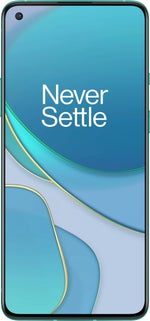
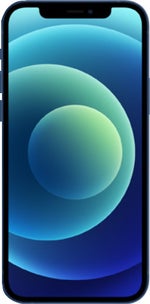


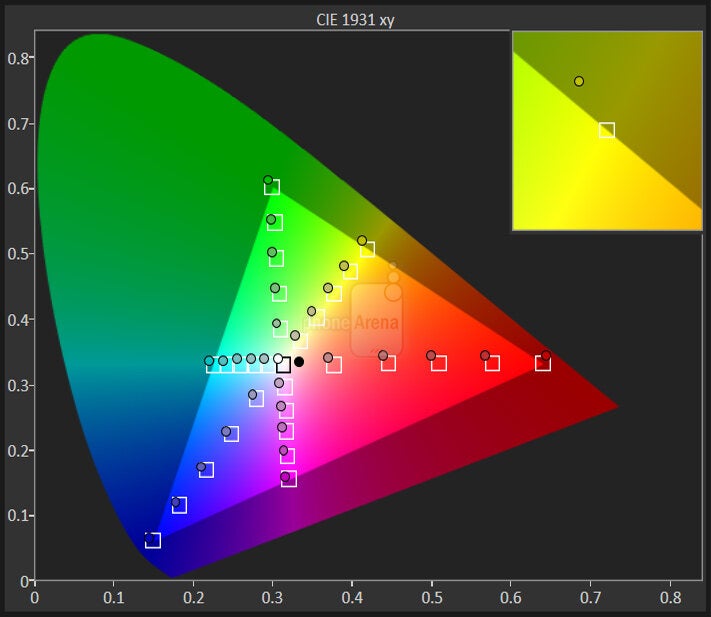


























Things that are NOT allowed:
To help keep our community safe and free from spam, we apply temporary limits to newly created accounts: